If you’re thinking about attending culinary school, you’re probably wondering what you can learn. Knife skills? How to combine flavors? The best way to order ingredients?
While culinary education may introduce you to skills and techniques that can help set you up for a culinary career, it can also teach you things that you can use every day, both in and out of the kitchen.
Here are some lessons from culinary school that you can use every day – and not just in culinary contexts!
1. You Can Always Learn Something New
While you may think the best chefs walk around like they know everything, the opposite is true! Top chefs know how to check their ego at the door and view each moment as a learning opportunity.
And culinary school is certainly not short on opportunities to learn something new. You may have the opportunity to explore unfamiliar flavor profiles in classes like Escoffier’s World Cuisines course, and you may discover a new strategy to improve familiar tasks like dicing onions and searing steaks.
“Arrogance can cause unnecessary chaos in a kitchen, [and it’s] frustrating to deal with. We have all had to cook with the Ron Burgundys of the kitchen world.”*
Chef Meghann Shaffer, Escoffier Pastry Arts Instructor
Along with showing you how to be open to learning, culinary school can also provide you opportunities to practice accepting constructive criticism. As a culinary school student, you can work to humbly accept critiques from Chef Instructors and other students alike.
2. Teamwork Is Dreamwork
While the coveted title of chef is only given to one person at a time, a whole team of people stands behind these talented individuals. No matter if you’re working as the Chef de Cuisine or as a Garde-manger, you’ll be expected to work with others both in and out of your station.
In culinary school, you can learn how to work with classmates to accomplish your goals, whether that’s creating a well-balanced dish or executing the assembly of hundreds of hors d’oeuvres.
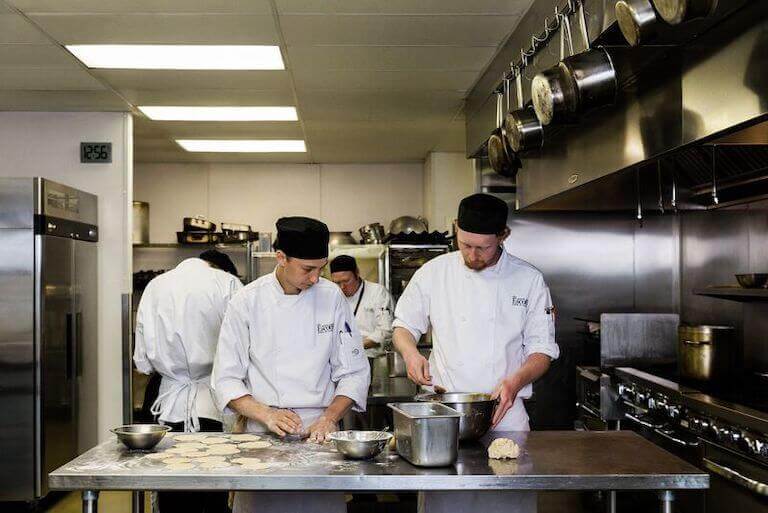
Escoffier students can also continue to see the importance of teamwork during their culinary externship. By spending time in working kitchens, students can practice being a great teammate, whether that means delegating a task when they’re overwhelmed, jumping from their prep station to remove a pan of burning onions, or cleaning up their and their co-worker’s workstations at the end of the day.
“Teamwork is dream work, and you need to have one eye and one ear on everyone else in the space at all times.”*
Chef Steve Konopelski, Escoffier Pastry Arts Instructor
3. Manage Your Time… or It Will Manage You
If you’ve ever spent time in a professional kitchen, you know there are dozens of things happening at once, and not every dish involves a non-stop linear process.
As a culinary school student, you can practice how to embrace time management as you tackle an evolving list of tasks. This may involve organizing your workstation ahead of time (mise en place is key), recognizing and prioritizing the most urgent tasks, and making the most of every available minute. By managing your time well, you can feel more in control of what’s happening in the kitchen, rather than feeling like the kitchen has control over you.
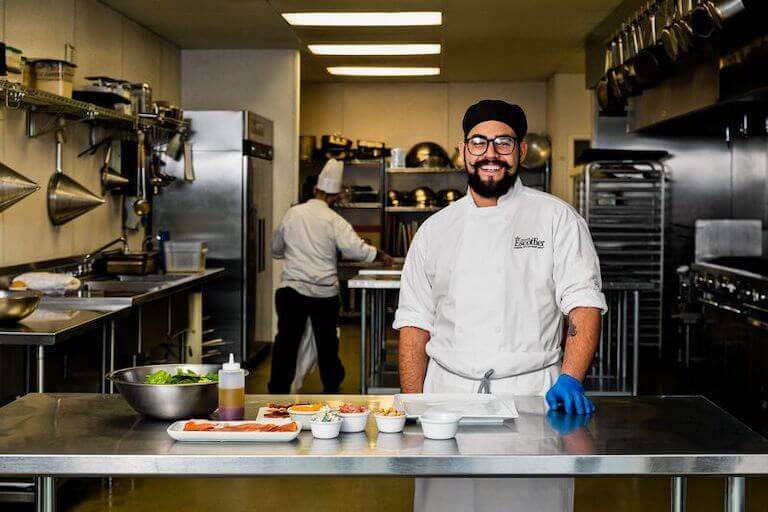
Let’s say you’re preparing a dish that consists of a smoked pork chop and mashed potatoes and spinach with a carrot purée. Not only do you have to prepare all of these components, but you’ll need to time it so that each one is done at the same time. That may mean making the purée, washing the spinach, and cutting the potatoes ahead of time, so you can assemble the final components as the pork chop is resting.
Not only can improving time management help you in the kitchen, but it can also help you better manage and balance aspects of your personal life. Simply attending culinary school can provide you with the opportunity to practice balance, as you work to successfully juggle your coursework with personal life, family, and maybe even a job. While multiple responsibilities like walking the dog, washing a load of laundry, and preparing dinner may have once seemed overwhelming, culinary school can help you manage these tasks with a bit more ease.
4. Perfection Comes With Perseverance
The first time you roll out ravioli or sear a filet, the results are unlikely to be perfect. However, rather than throw in the towel and call it quits, it’s time to try again!
“The more you put yourself in uncomfortable situations, or new situations, the better you get at being in those uncomfortable situations. And then being uncomfortable kind of loses its meaning and your confidence builds. You realize that you can do anything. I think that’s an important lesson.”*
Emily Maddy, Chef Instructor
Culinary school can provide students with the opportunity to practice certain techniques over and over again, while receiving advice and feedback from Chef Instructors. As students progress through their courses, they often notice their skills improve.
For example, a student’s first attempt at ravioli may have resulted in torn dough and leaking filling, but with a bit of practice the end result may be stunning! Just check out this exquisite squid ink and spinach pasta filled with poached prawn, ricotta & fennel from Escoffier student Xander Z.
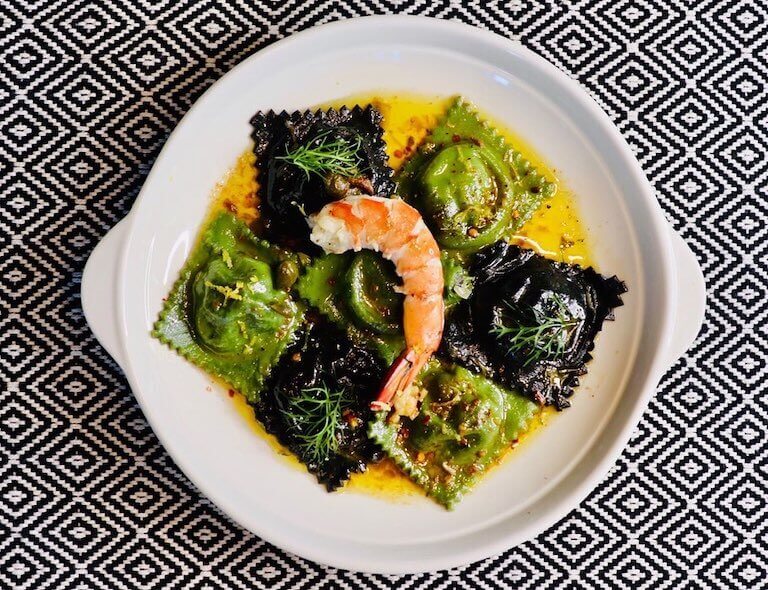
This perseverance can help you tackle advanced culinary techniques and work towards your dream of becoming a chef, but it can also help you each day as you work through everyday challenges.
5. Patience Can Lead to Quicker Results
If you’ve ever tried cooking a tough pork shoulder or proofing a baguette while in a rush, you know that a quick process doesn’t always lead to the best results. Instead, it can lead to a failed product, frustration, and the need to start over.
As a culinary school student, you can examine the importance of patience on both a large and small scale. You may see the importance of mastering the basics before you attempt advanced skills, as well as how rushing caramelizing onions or braising spare ribs can lead to subpar results.
The Essential Culinary Career Survey
The Essential Culinary Career Survey
What's your ideal culinary career: Fine dining? Your own restaurant? Pastry? Get our self-evaluation survey to find out!

We’ve compiled a checklist of all of the essential questions into one handy guide: career options, culinary interest surveys, educational opportunities, and more.
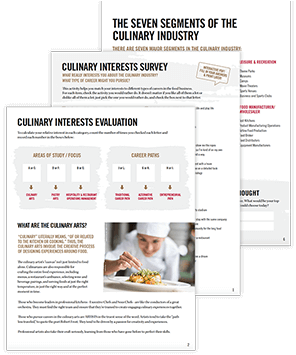

When you head out of the kitchen, you can remember the benefits of being patient. While you may be tempted to quickly buy that new car or paint a room in your house in a rush, you can practice the patience that leads to the results you’re looking for.
Find the Right Culinary School Program for You
To obtain these lessons from culinary school and carry them into your future, the first step is enrolling in a program that’s right for you.
Escoffier offers both degree and diploma culinary arts programs as well as the option to attend in-person or online. And all these programs include a hands-on industry culinary externship where you can practice incorporating the lessons you’ve learned in the classroom.
If you’re interested in selecting a program that’s right for you, contact us today.
To learn more about the value of a culinary education, read these articles next:
- Can You Go to Culinary School with No Prior Experience?
- Should I Go to Culinary School? A Guide for Deciding
- Is Culinary School Necessary to Be a Chef?
This article was originally published on June 18, 2018 and has since been updated.
*Information may not reflect every student’s experience. Results and outcomes may be based on several factors, such as geographical region or previous experience.

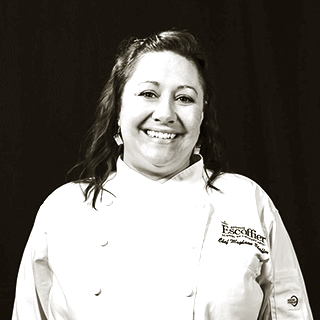 “Arrogance can cause unnecessary chaos in a kitchen, [and it’s] frustrating to deal with. We have all had to cook with the Ron Burgundys of the kitchen world.”*
“Arrogance can cause unnecessary chaos in a kitchen, [and it’s] frustrating to deal with. We have all had to cook with the Ron Burgundys of the kitchen world.”*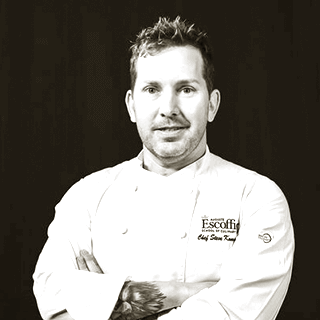 “Teamwork is dream work, and you need to have one eye and one ear on everyone else in the space at all times.”*
“Teamwork is dream work, and you need to have one eye and one ear on everyone else in the space at all times.”* “The more you put yourself in uncomfortable situations, or new situations, the better you get at being in those uncomfortable situations. And then being uncomfortable kind of loses its meaning and your confidence builds. You realize that you can do anything. I think that’s an important lesson.”*
“The more you put yourself in uncomfortable situations, or new situations, the better you get at being in those uncomfortable situations. And then being uncomfortable kind of loses its meaning and your confidence builds. You realize that you can do anything. I think that’s an important lesson.”*